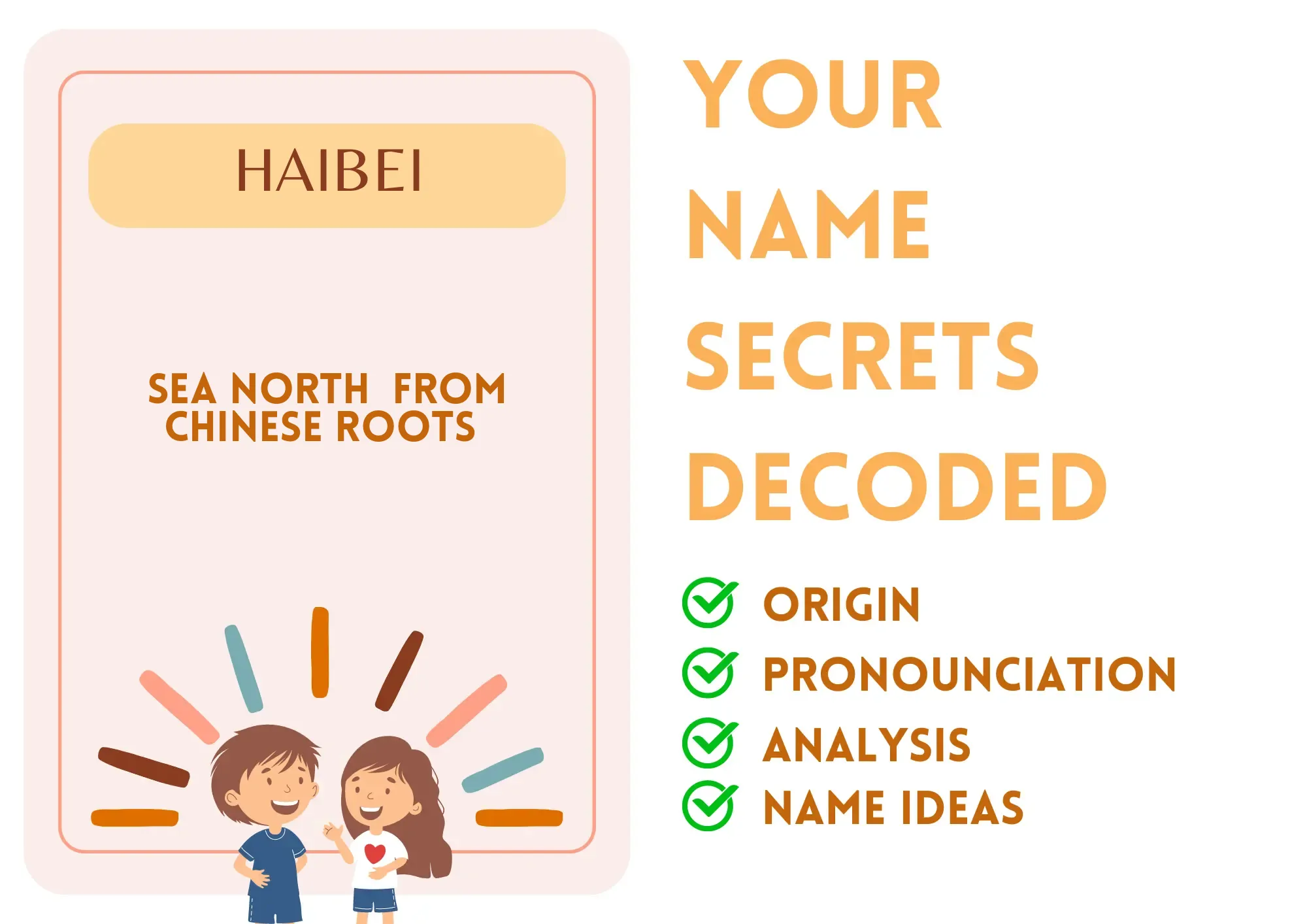
Haibei
Haibei is an intriguing name, often interpreted to mean 'sea' combined with 'north' in Chinese (海北). As a name, it reflects a connection to nature, particularly the ocean and the north, and is predominantly used for boys, though it can also be considered unisex. The name is rooted in Chinese culture, specifically associated with scenery and geographic locations.
Culturally, Haibei evokes images of vast oceans and northern landscapes, making it a poetic choice for parents who appreciate nature. The name is regarded positively, reflecting strength and serenity. It is relatively easy to write and pronounce, with potential nicknames that add charm.
While Haibei is not widely represented in popular culture, its geographic connotations resonate deeply in literature and expressions that celebrate nature. Overall, Haibei is appreciated for its unique sound and depth of meaning, rooted in the scenic beauty of China.
Basic Information
Gender: Unisex
Sounds Like: HIGH-bay
Pronunciation Explanation: The first syllable 'HAI' rhymes with 'high', and the second syllable 'bei' sounds like 'bay'.
Summary and Meaning
Meaning: sea north (from Chinese roots)
Origin: The name Haibei has Chinese origins, particularly in geographic naming conventions and natural elements.
Usage: Haibei is predominantly used as a masculine name but can also be unisex, allowing flexibility for naming.
Name Number (Chaldean)
Name Number (Pythagorean)
Popularity (Global Rank)
Overall: 313167
Boys: 72681
Girls:
Most Popular in
Religious and Cultural Significance
Religion: Buddhism
Background: In many Chinese cultural contexts, Buddhist ideals intertwine with names, making them inspire philosophical and natural associations.
Cultural Significance: Haibei connects deeply with cultural appreciation for nature, symbolizing the majesty of the sea and northern landscapes in Chinese culture.
Historical Significance: While Haibei itself does not hold extensive historical prominence as a standalone name, its components symbolize geographical features that have been significant in Chinese exploration and poetry throughout history.
Popular Culture
Literature and Mythology: The concepts associated with 'sea' and 'north' might feature in poetry celebrating natural beauty but are not often represented as character names.
Movies and Television: There are minimal references to characters with the name Haibei, but themes of nature and exploration are prevalent in many Chinese films, echoing what the name stands for.
Feelings and Perceptions
Perception: Haibei is generally perceived as a calm yet powerful name, evoking imagery of serene waters and expansive landscapes. Echoing a connection to nature, it carries a depth of feeling.
Positive Feelings: Calm, serene, strong, poetic, connected to nature.
Negative Feelings: Some may find it unfamiliar or difficult to pronounce correctly at first glance.
Practical Considerations
Ease of Writing and Calling: Haibei is relatively straightforward to write and pronounce. It consists of six letters and two syllables, making it memorable and accessible.
Common Typos and Misspellings: Haibe,Haibai,HaiBei,Haibie
Common Nicknames: Hai,Bei,Bai
Haibei Popularity
Haibei Usage and Popularity By Country
| Country | Rank (Overall) |
|---|---|
| Singapore | 53638 |
| Germany | 81441 |
| United States | 102851 |
| Australia | 105589 |
| Canada | 149654 |
| United Kingdom | 182431 |
Haibei Usage and Popularity By City
| City | Rank (Overall) |
|---|---|
| Shanghai | 4053 |
| Durham | 2807 |
| San Francisco | 29357 |
| Hattiesburg | 1424 |
| New York | 52406 |
Compatibility Analysis
Famous Persons Named Haibei
No results found for Haibei.
Related Names
Similar Sounding Names:
Hibiki,Hamer,Harvey,Havish
Similar Meaning and Related Names:
Sibling Name Ideas (Brothers):
Jun ♀️
Jun ♂️
Buddhist, Shinto (Japanese), Confucianism (Korean)